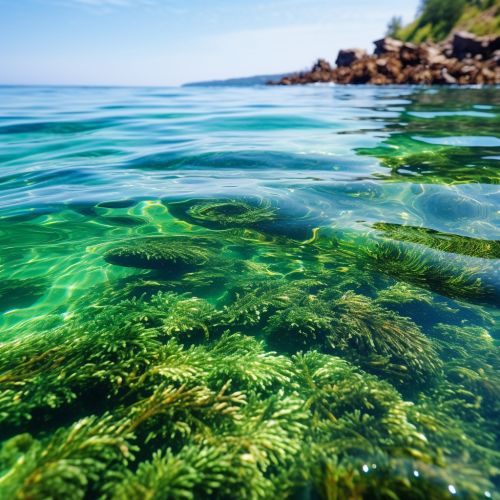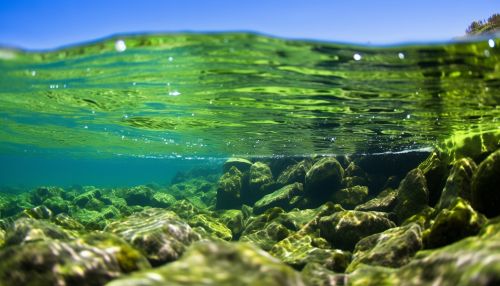Antioxidant Mechanisms in Marine Algae
Introduction
Antioxidants are molecules that inhibit the oxidation of other molecules, a chemical reaction that can produce free radicals, leading to chain reactions that may damage cells. Marine algae, due to their unique living conditions, have developed a range of antioxidant mechanisms to protect themselves from oxidative stress. These mechanisms are of significant interest to researchers due to their potential applications in human health and nutrition.


Oxidative Stress in Marine Algae
Marine algae are constantly exposed to various environmental stressors such as ultraviolet (UV) radiation, temperature fluctuations, and changes in salinity. These stressors can lead to the production of reactive oxygen species (ROS), which are highly reactive molecules that can cause oxidative damage to cellular components such as lipids, proteins, and DNA. This state of imbalance between the production of ROS and the ability of the organism to detoxify these reactive intermediates or to repair the resulting damage is known as oxidative stress.
Antioxidant Compounds in Marine Algae
Marine algae have developed a range of antioxidant compounds to counteract oxidative stress. These include phenolic compounds, carotenoids, and vitamins such as vitamin C and E.
Phenolic Compounds
Phenolic compounds are a diverse group of chemical compounds characterized by the presence of a phenol ring. In marine algae, these compounds act as potent antioxidants, neutralizing ROS and preventing oxidative damage. Phenolic compounds in marine algae include phlorotannins, a type of tannin found only in brown algae (Phaeophyceae).
Carotenoids
Carotenoids are pigments that are naturally occurring in the chloroplasts and chromoplasts of plants and some other photosynthetic organisms like algae. They serve two key roles in these organisms: harvesting light for photosynthesis and protecting the organism from damage by light and oxygen. In marine algae, carotenoids such as beta-carotene and astaxanthin have been identified as potent antioxidants.
Vitamins
Marine algae are a rich source of vitamins with antioxidant properties, including vitamin C (ascorbic acid) and vitamin E (tocopherols). These vitamins are essential for human health, and their antioxidant properties make them of interest for their potential to protect against oxidative stress.
Antioxidant Enzymes in Marine Algae
In addition to antioxidant compounds, marine algae also produce a range of antioxidant enzymes that neutralize ROS. These include superoxide dismutase (SOD), catalase (CAT), and peroxidases.
Superoxide Dismutase
Superoxide dismutase is an enzyme that catalyzes the dismutation of superoxide (O2−) into oxygen and hydrogen peroxide. This is a critical antioxidant defense in nearly all cells exposed to oxygen. In marine algae, different forms of SOD have been identified, including copper-zinc SOD and iron SOD.
Catalase
Catalase is an enzyme that catalyzes the decomposition of hydrogen peroxide to water and oxygen. This enzyme plays a key role in protecting the cell from oxidative damage by ROS. In marine algae, CAT activity has been found to be higher in species exposed to higher levels of environmental stress.
Peroxidases
Peroxidases are a large family of enzymes that are widely distributed in plants, animals, and microorganisms. These enzymes play a key role in the detoxification of peroxides. In marine algae, peroxidases have been found to play a critical role in the antioxidant defense system.
Potential Applications of Antioxidants from Marine Algae
Due to their potent antioxidant properties, compounds from marine algae have potential applications in various fields, including human health and nutrition, cosmetics, and aquaculture.
Health and Nutrition
The antioxidant compounds found in marine algae, including phenolic compounds, carotenoids, and vitamins, have potential health benefits. These include protection against cardiovascular disease, cancer, and neurodegenerative diseases, which have been linked to oxidative stress.
Cosmetics
In the cosmetics industry, antioxidants from marine algae are of interest for their potential to protect the skin from oxidative damage. This includes protection against UV-induced skin damage, which can lead to premature skin aging and skin cancer.
Aquaculture
In aquaculture, antioxidants from marine algae are used to improve the health and growth of cultured species. They can also be used to improve the quality of aquaculture products, by preventing oxidative spoilage.
